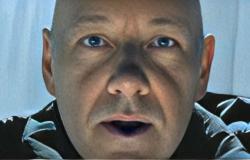«It’s a very personal book. In various forms, it is a book about writing, about the relationship between a writer and his subject, about the infinitely complex work of trying to get to the truth, starting from a terrible event, of the person who was the protagonist. Perhaps the greatest challenge was trying to penetrate the dense network of misdirections, fantasies, self-deceptions – and often outright lies – that Macarthur weaved around himself, to reach a sort of truth. In order to tell this story honestly, I felt I had to recognize the extent to which I myself was a character in it.”
Mark O’Connell, the Irish journalist and writer who, with Being a Machine and Notes from an Apocalypse investigated the darkest recesses of our time and our future, talks about A Thread of Violence. A story of truth, invention and murder (Il Saggiatore, 296 pages, 20 euros, translated by Alessandra Castellazzi), his latest novel, a journey into darkness in which he tells of Malcom Macarthur, whose criminal madness shocked Ireland in 1982. will present today on the last day of «Salerno literature» (at 10 pm in the cathedral), which will also see Giancarlo De Cataldo, Barbara Alberti, Ellie B. Luin, Eric Chevillard, Filippo Ceccarelli and the finalists of the Premio Strega parade.
O’Connell, you were a child at the time of your arrest.
«I was about 8 years old when I heard about it from my father. The arrest had taken place in the building where my grandparents lived. The fact that a murderer had been caught in the house of a famous politician, right next to their apartment, was a very exciting thing in my childhood eyes. I suppose that was my first entry into the labyrinth of an obsession, at the center of which, over three decades later, I finally found Macarthur.”
And he decided to write a book.
«It happened gradually and spread out over time, and then very quickly. After the release of Macarthur I happened to see him around, I was intrigued: I wondered what it felt like to be such a well-known person – a real “villain” who made history – in such a small city like Dublin. I wondered about his life. Just before the pandemic, I realized that I wanted to write about him. I felt instinctively that he would be a fascinating character, whose story could reveal unexpected things about Ireland, but also about the darkest recesses of human nature.”
How did you balance your personal experience with the objectivity needed for a non-fiction novel?
«I did a lot of archival research, I spoke with Macarthur for dozens of hours, with detectives, with people who had played some kind of role in his life. The facts, as they unfolded, were and are known. On the one hand I had a relatively linear story to tell; on the other, I felt that it needed to be constantly questioned and subverted. In this sense, my conversations with Macarthur and my personal, subjective experience in relation to it are really the heart of the book. I also dedicated a great deal of space to the ethical and epistemological issues related to writing this type of narrative. It has been called an anti-true crime book, it wasn’t intentional – the genre doesn’t obsess me so much that I want to subvert its rules – but in many ways it’s true that it goes against the grain of this type of book.”
Irish society has experienced a real collective trauma.
«There has been a huge impact. They were shocking crimes, for one thing, and the nature of Macarthur himself – his aristocratic personality, his connections with powerful and privileged people – fueled around these murders an aura of scandal, of conspiracies, which still has not completely dissipated today. Even a government was about to fall.”
What were Macarthur’s psychological motivations?
“I think, in a dark and disturbing way, he was acting in self-defense. This is not to exonerate him from his faults, far from it, but I believe that his idea of himself was so linked to an almost aristocratic sense of freedom and self-determination that the prospect of being left without money and without a job turned into an existential threat . That’s why he decided to try to rob a bank. The murders that followed I believe were the result of a blind panic at the situation that had arisen. It is an interpretation that must be taken with caution, but there is something that still cannot find a satisfactory explanation. What interests me most is precisely this ambiguity, this impenetrability. That’s largely what the book is about, in fact.”
© ALL RIGHTS RESERVED
Read the full article at
The morning




